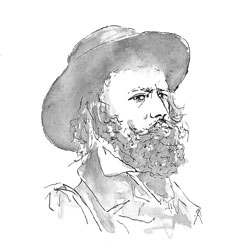A contemporary view: Richard Holt Hutton on Tennyson
In this essay undergraduate Judith Jacob looks at what a contemporary reader made of Tennyson's work. A lot can be learned from the first critics of a poet's work. While their assumptions about literature may be very different from ours, they give a vivid sense of the literary world in which the poems first appeared.
One of nineteenth century England's most important literary critics was the writer and theologian Richard Holt Hutton (June 2, 1826 - September 9, 1897). He was joint editor of the popular liberal journal The Spectator, and also one of the most influential and best-respected journalists of his age. In his work he most often took a religious standpoint, writing in opposition to rational and agnostic viewpoints such as those put forward by the biologists T.H. Huxley, Charles Darwin, and literary critics such as Matthew Arnold.
The 1917 Cambridge History of English Literature dismissed Holt as an influential critic when it states that 'to purely aesthetic considerations he was not highly sensitive, and his criticisms are not, intrinsically, of very great value' (vol. 14, p. 156). However, it is important to look at the work of poets through the eyes of their contemporary critics and Tennyson is no exception. After all, the criticism, the readership and the poetry itself work together in an intricate discourse rather than separately and in isolation. Thus, a better way to look at Hutton's stance on Tennyson would be to acknowledge that while Hutton is much more interested in the moral improvement on offer in literature than modern critics tend to be, on the whole he provides some interesting and astute observations, and these observations are at least valuable historically, if not aesthetically.
Though we now take Tennyson for granted as a traditional and canonical poet, to a contemporary audience Tennyson's poetry was radically experimental in the ways it challenged standard linear narrative, especially in long and fragmentary poems such as In Memoriam and The Idylls. In his essay 'The Genius of Tennyson', Hutton recognises and criticises the difficulty that contemporary audiences experienced through Tennyson's poetry when he writes that 'an original poet is usually more or less unwelcome to those who have formed their own taste on older models' (A Victorian Spectator, p. 253). Hutton is reassuringly supportive of the 'original' style of Tennyson although he complains that Tennyson 'harps too much on the minor key' with an 'over-wrought pathos' (A Victorian Spectator, p. 255). This dislike of the 'minor key' provides little actual insight into the style, or overemphasis of style in the poetry, but ironically reveals Hutton's own emotional response to unrestrained sentiment and overflowing emotion. He is uncomfortable with Tennyson's melancholy and feels himself to be on safer ground when Tennyson is neatly bounded within poetic structures. Hutton writes that in 'Tithonus' and 'Ulysses' 'we see the artist at his highest point - the intensity of the feeling not allowed to overflow into any excess or redundancy of expression, but restrained' (A Victorian Spectator, p. 255).
The need for strong religious morality and fixed emotion that Hutton describes in 'The Genius of Tennyson' can be seen as symptomatic of a Victorian attitude to poetry and poetic minds. Often Victorian critics read poetry to explore the soundness, or otherwise, of the mind that produced it. (There is further information about this point on a useful page in the 'Victorian Web', which can be found at http://www.victorianweb.org/science/health/health13.html.) Hutton's readings of Tennyson will not provide the modern reader with groundbreaking aesthetic observances or close readings, but they are indispensable to anyone who wants a solid idea of Tennyson's work and the way it functioned within the Victorian discourse of literary thought and criticism.
Works Cited
A. W. Ward and A. R. Waller, The Cambridge History of English Literature, vol. XIV (Cambridge: Cambridge University Press, 1917). [Note that there is a newer edition of this literary history.]
Richard Holt Hutton, A Victorian Spectator: Uncollected Writings of R. H. Hutton, ed. Robert H. Tener and Malcolm Woodfield (Bristol: Bristol Classical Press, 1989).
Further Thinking
Judith Jacob identifies some characteristics of Victorian criticism that most modern critics would not identify with, e.g. an interest in the soundness of the poet's mind, and an interest in the moral benefits of reading a particular work. Why do you think these are, or are not, valid interests for a critic?
Hutton may not read Tennyson like we read Tennyson, but perhaps his approach would have been more familiar to the poet than ours would be. Are there places in Tennyson's work where you think he seems to think a bit like Hutton?
